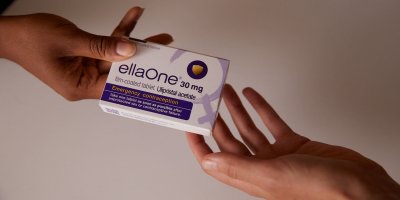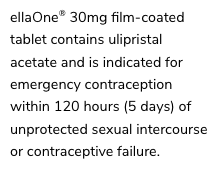How does the Morning After Pill work?
If you’ve had unprotected sex or experienced contraceptive failure and you’re not trying to get pregnant, we know you might be worried about unplanned pregnancy. The morning after pill can be taken to reduce the risk of pregnancy, but how does it work? Read on to find out.
What Is The Morning After Pill?
The morning after pill is a single tablet which can be taken to help prevent unplanned pregnancy in the event of unprotected sex or contraceptive failure.
There are two kinds of morning after pill available in Ireland. Ulipristal acetate (contained in ellaOne) and levonorgestrel. No other morning after pill is more effective than ellaOne when used within 24 hours of unprotected sex.
How does ellaOne work?
ellaOne contains ulipristal acetate, which works by delaying or inhibiting ovulation. Once sperm have been ejaculated into the vagina, they can live in the uterus for up to five days. ellaOne can help by delaying ovulation until the sperm that entered the cervix die. It works in a similar way to birth control pills which also help prevent ovulation.
The morning after pill works by delaying ovulation, so if ovulation has already occurred it will not be effective and pregnancy may still take place. It is really hard to determine exactly when you are ovulating as everyone’s menstrual cycle is different and it can change from month to month depending on numerous factors such as altered sleep patterns, diet and birth control.
Even if you think you’ve already ovulated, it’s worth speaking to your healthcare provider who can help you make an informed decision about whether emergency contraception would be suitable for you.
While pregnancy is less likely to occur during certain times in your menstrual cycle, such as your period, some people may have short cycles and can ovulate or be at risk of pregnancy while they are still menstruating. Please speak to your healthcare provider, like a doctor or pharmacist, if you have any concerns.
The morning after pill helps prevent an egg and a sperm from meeting and can help stop pregnancy from taking place. The morning-after pill does not cause an abortion and cannot interrupt an existing pregnancy. There is no evidence to suggest taking an emergency contraceptive pill can harm an unborn child.
Emergency contraceptive pills like ellaOne are for single use only and will not prevent pregnancy from further incidents of unprotected sex. It is recommended that you use a barrier method such as condoms or talk to your healthcare provider about your contraceptive options. There is no evidence that taking ellaOne can affect your long term fertility. If you have unprotected sex again, you can use ellaOne more than once (even in the same cycle) but remember: ellaOne is intended for emergency use only and should not be used in place of a regular contraceptive.
What Type Of Emergency Contraception Is Right For Me?
There are two types of emergency contraceptive pill: ulipristal acetate (contained in ellaOne) and levonorgestrel.
No other morning after pill is more effective than ellaOne. ellaOne may be used in the event of unprotected sex or contraceptive failure, like if the condom breaks or you miss your birth control pill.
Levonorgestrel can help prevent unplanned pregnancy if taken within three days (72 hours) of unprotected sex or contraceptive failure.
The IUD is another form of emergency contraception which also works as a long-acting reversible contraceptive (LARC). Sometimes known as the coil, the IUD is a T-shaped device made out of plastic and copper which is inserted into the womb by a nurse or doctor. It releases copper which thickens the cervical mucus around the womb, which stops sperm from being able to meet with the egg.
When the IUD is fitted correctly, this method of contraception is 99% effective and can remain in the body for up to ten years. Did you know that ellaOne has a handy comparison table where you can compare different types of emergency contraception? If you need more guidance on how to choose emergency contraception, you should consult a healthcare professional, who will be able to help you.
What Should I Expect After Taking ellaOne?
ellaOne is generally well-tolerated, but some people may experience mild side effects such as feeling sick, stomach pain, headache, changes in mood and breast tenderness. If you have any concerns about side effects, we recommend you speak to your healthcare provider who will be able to advise you.
Some medications, such as liver enzyme-inducing medications, St Johns Wart, barbiturates and some HIV medicines, can also impact the effectiveness of ellaOne and levonorgestrel. Please tell your healthcare provider about any medications you are taking so they can help you make an informed decision.
The morning after pill levonorgestrel can sometimes delay your period by up to five days and ellaOne may delay your period by up to seven days. If your period is later than seven days, or if you have any concerns about pregnancy, it is recommended that you speak to a healthcare provider like a doctor or pharmacist.
We understand that you may be anxious to know if the morning after pill has worked, but unfortunately, the only way to know is to wait for your period. If you think you might be pregnant, we recommend that you take a pregnancy test 21 days after unprotected sex.
We know that there is a lot riding on one little morning after pill, but we hope this article has helped to put your mind at ease and given you the information to make an informed decision. Want to buy ellaOne? Read about your options here. Did you know you can also buy the morning after pill online to collect instore?
ellaOne® 30mg film-coated tablet contains ulipristal acetate and is indicated for emergency contraception within 120 hours (5 days) of unprotected sex or contraceptive failure. Always read the label.






